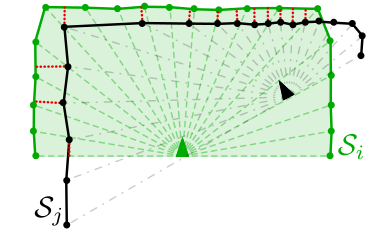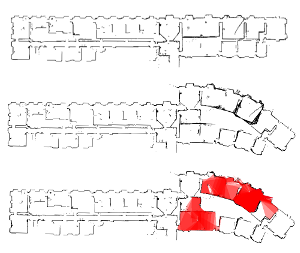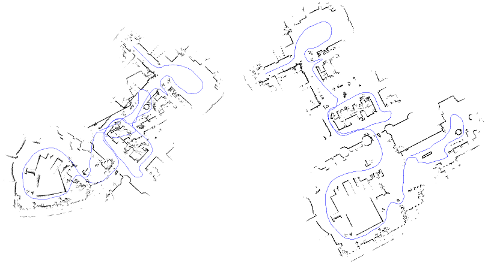Mladen Mazuran
Consist
On this page you can find the implementation of our work on map consistency and parameter optimization for SLAM that got accepted at ICRA 2014. The software comes in the form of a documented library (Consist), with two helper executables, one for checking the consistency of a map and the other for determining the optimal scale parameter for DCS.
A Statistical Measure for Map Consistency in SLAM
To appear in: Proceedings of the International Conference on Robotics and Automation (ICRA), Hong Kong, 2014
Download BibTeX
Abstract -- Map consistency is an important requirement for applications in which mobile robots need to effectively perform autonomous navigation tasks. While recent SLAM techniques provide an increased robustness even in the context of bad initializations or data association outliers, the question of how to determine whether or not the resulting map is consistent is still an open problem. In this paper, we introduce a novel measure for map consistency. We compute this measure by taking into account the discrepancies in the sensor data and leverage it to address two important problems in SLAM. First, we derive a statistical test for assessing whether a map is consistent or not. Second, we employ it to automatically set the free parameter of dynamic covariance scaling, a robust SLAM back-end. We present an evaluation of our approach on over 50 maps sourced from 16 publicly available datasets and illustrate its capability for the inconsistency detection and the tuning of the parameter of the back-end.

Fig. 1. Toy example of pairwise consistency measure.
The overall length of the dotted red lines is the cnsistency measure between two scans.

Fig. 2. Inconsistencies detected in a corrupted Belgioioso dataset.
Top image: consistent dataset, middle: inconsistent dataset, bottom: detected inconsistencies.

Fig. 3. Corrupted Edmonton dataset for the DCS Φ=1 uninformed choice (left), and for Φ=0.012, the value computed by our calibration algorithm (right).
Paper
Mladen Mazuran, Gian Diego Tipaldi, Luciano Spinello, Wolfram Burgard, Cyrill StachnissA Statistical Measure for Map Consistency in SLAM
To appear in: Proceedings of the International Conference on Robotics and Automation (ICRA), Hong Kong, 2014
Download BibTeX
Abstract -- Map consistency is an important requirement for applications in which mobile robots need to effectively perform autonomous navigation tasks. While recent SLAM techniques provide an increased robustness even in the context of bad initializations or data association outliers, the question of how to determine whether or not the resulting map is consistent is still an open problem. In this paper, we introduce a novel measure for map consistency. We compute this measure by taking into account the discrepancies in the sensor data and leverage it to address two important problems in SLAM. First, we derive a statistical test for assessing whether a map is consistent or not. Second, we employ it to automatically set the free parameter of dynamic covariance scaling, a robust SLAM back-end. We present an evaluation of our approach on over 50 maps sourced from 16 publicly available datasets and illustrate its capability for the inconsistency detection and the tuning of the parameter of the back-end.

Fig. 1. Toy example of pairwise consistency measure.
The overall length of the dotted red lines is the cnsistency measure between two scans.

Fig. 2. Inconsistencies detected in a corrupted Belgioioso dataset.
Top image: consistent dataset, middle: inconsistent dataset, bottom: detected inconsistencies.

Fig. 3. Corrupted Edmonton dataset for the DCS Φ=1 uninformed choice (left), and for Φ=0.012, the value computed by our calibration algorithm (right).
Changelog
- 2014-07-29 – v0.1 – Fixed a bug in the released implementation. The tests for the DCS parameter calibration in the ICRA paper relied on not putting a robust kernel on the odometric chain, thus obtaining different results. Also the Pareto-optimal configurations that were reported on the ICRA paper are now available for download.
Download
- Consist v0.1 source
- Pareto frontier (in terms of confidence values) that was plotted on the ICRA paper
- Tagged datasets for consistency evaluation
- Datasets for DCS parameter calibration

